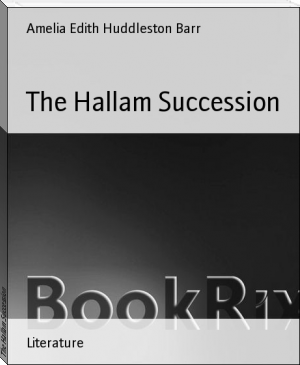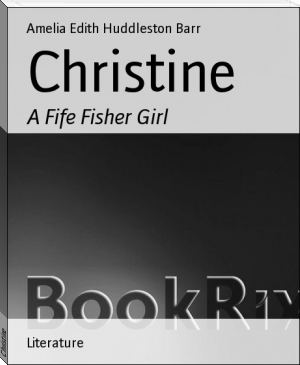The Hallam Succession, Amelia Edith Huddleston Barr [desktop ebook reader .txt] 📗

- Author: Amelia Edith Huddleston Barr
Book online «The Hallam Succession, Amelia Edith Huddleston Barr [desktop ebook reader .txt] 📗». Author Amelia Edith Huddleston Barr
"Martha! How could you bear it?"
"I didn't think what I wer' bearing at t' time, Miss Hallam; I wer' just angry enough for any thing; and I wer' kind o' angry wi' Ben takkin' it so quiet like. 'Speak up for thysen, lad,' I said; 'hesn't ta got a tongue i' thy head to-neet?'"
"Poor Ben! What did he say?"
"He said, 'Thou be still, mother, and talk to none but God. I'm as innocent o' this sin as thou art;' and I said, 'I believe thee, my lad, and God go wi' thee, Ben.' There's one thing troubles me, Miss Hallam, and it bothered t' squire, too. Ben was in his Sunday clothes-- that wasn't odd, for he was going to t' chapel wi' me--but Jerry noticed it, and he asked Ben where his overlooker's brat and cap was, and Ben said they wer' i' t' room; but they wern't there, Miss Hallam, and they hevn't found 'em either."
"That is strange."
"Ay, its varry queer, and t' constables seemed to think so. Jerry nivver liked Ben, and he said to me, 'Well, dame, it's a great pity that last o' t' Cravens should swing himsen to death on t' gallows.' But I told him, 'Don't thee be so sure that Ben's t' last o' t' Cravens: Thou's makkin' thy count without Providence, Jerry;' and I'm none feared," she added, with a burst of confidence; "I'll trust in God yet! I can't see him, but I can feel him."
"And you can hold fast to his hand, Sister Martha; and the darker it gets, you can cling the closer, until the daylight breaks and the shadows flee away."
"That I can, and that I will! Look there, my dearies!" and she pointed to a little blue and white tea-pot on the high mantle-shelf, above the hearth on which they were sitting. "Last night, when they'd taken Ben away, and I couldn't finish t' psalm and I couldn't do much more praying than a little bairn thet's flayed and troubled in t' dark night, I lifted my eyes to thet tea-pot, and I knew t' words thet was on it, and they wer' like an order and a promise a' in one; and I said, 'There! thet's enough, Lord!' and I went to my bed and slept, for I knew there 'ud be a deal to do to-day, and nothing weakens me like missing my sleep."
"And did you sleep, Martha?"
"Ay, I slept. It wasn't hard wi' t' promise I'd got."
Then Phyllis took a chair and stood upon it, and carefully lifted down the tea-pot. It was of coarse blue and white pottery, and had been made in Staffordshire, when the art was emerging from its rudeness, and when the people were half barbarous and wholly irreligious--one of half a dozen that are now worth more than if made of the rarest china, the Blue Wesley Tea-pot; rude little objects, yet formed by loving, reverential hands, to commemorate the apostolic labors of John Wesley in that almost savage district. His likeness was on one side, and on the other the words, so often in his mouth, "_In God we trust._" Phyllis looked at it reverently; even in that poor portraiture recognizing the leader of men, the dignity, the intelligence, and the serenity of a great soul. She put it slowly back, touching it with a kind of tender respect; and then the two girls went home. In the green aisles of the park the nightingales were singing, and the sweet strength of the stars and the magic of the moon touched each heart with a thoughtful melancholy. Richard and Antony joined them, and they talked softly of the tragedy, with eloquent pauses of silence between.
On the lowest terrace they found the squire--Fanny walking with quiet dignity beside him. He joined Elizabeth and Richard, and discussed with them the plans he had been forming for the unraveling of the mystery. He had thought of every thing, even to the amount of money necessary.
"Have they no relations?" asked Richard, a little curiously. It seemed to him that the squire's kindness was a trifle officious. However lowly families might be, he believed that in trouble a noble independence would make them draw together, just as birds that scatter wide in the sunshine nestle up to each other in storm and cold. So he asked, "Have they no relatives?"
"She has two brothers Ilkley way," said the squire, with a dubious smile. "I nivver reckoned much on them."
"Don't you think she ought to send for them?"
"Nay, I don't. You're young, Richard, lad, and you'll know more some day; but I'll tell you beforehand, if you iver hev a favor to ask, ask it of any body but a relation--you may go to fifty, and not find one at hes owt o' sort about 'em."
They talked for half an hour longer in a desultory fashion, as those talk who are full of thoughts they do not share; and when they parted Richard asked Elizabeth for a rose she had gathered as they walked home together. He asked it distinctly, the beaming glance of his dark eyes giving to the request a meaning she could not, and did not, mistake. Yet she laid it in his hand, and as their eyes met, he knew that as "there is a budding morrow in the midnight," so also there was a budding love in the rose-gift.
CHAPTER II.
"I am with thee, and no man shall set on thee to hurt thee."
Acts xviii, 10.
"There I will meet with thee, and I will commune with thee from
above the mercy-seat." Exod. xxv, 22.
No man liveth unto himself. In that green, flowery Eden, with the soft winds blowing in at the open doors and windows, and the white sunshine glorifying every thing, there was the whisper of sorrow as well as the whisper of love. The homely life of the village, with its absorbing tragedy, touched all hearts; for men and women belie their nature when they do not weep with those that weep.
At the close of the London season the Elthams returned to their country home, and there was much visiting and good-will. One evening they were sitting in Eltham drawing-room after dinner. The squire had been discussing the Clough tragedy with great warmth; for Lord Eltham had not unnaturally judged Ben Craven upon the apparent evidence, and was inclined to think his position, whether he was innocent or guilty, one of great danger. Hallam would not see things in any such light. He had lived only in the morally healthy atmosphere of the woods and fields, and the sinful tragedies of life had not been actual to him. True, he had read of them in his weekly paper, but it was a different thing when they came to his own door, and called for his active sympathy.
"Right is right, Eltham," he said, with the emphasis of one closed hand striking the other; "and it 'ud be a varry queer thing if right should turn out to be wrong. It'll do nowt o' t' sort, not it."
"But, Hallam, it seems to me that you hev made up your mind that Craven is right--right or wrong--and lawyer Swale told me t' evidence was all against him."
"Swale!" replied the squire, snapping his fingers disdainfully. "Why-a! Swale nivver told t' truth i' all his life, if he nobbut hed t' time to make up a lie. As for Bingley, I wish I hed sent him over t' seas when I hed t' chance to do it--he's none fit to breathe t' air in a decent country."
"But Swale says that Bill Laycock has acknowledged that he also saw Craven in his working clothes running over t' moor just about t' time Clough was shot, and Bill and Craven were at one time all but brothers."
"Ay, ay; but there's a lass between 'em now--what do you make o' that?"
"As far as I can think it out, it's against Craven."
"Then think twice about it, Eltham, and be sure to change thy mind t' second time; for I tell thee, Craven is as innocent as thee or me; and though t' devil and t' lawyers hev all t' evidence on their side, I'll lay thee twenty sovereigns that right'll win. What dost ta say, Phyllis, dearie?"
And Phyllis, who had been watching his large, kindly face with the greatest admiration, smiled confidently back to him, and answered, "I think as you do Uncle Hallam,
"'For right is right, since God is God;
And right the day must win;
To doubt would be disloyalty,
To falter would be sin.'"
Hallam looked proudly at her, and then at his opponent, who, with glistening eyes, bowed, and answered: "My dear young lady, that settles the question, here. I wish with a' my heart it did so in ivery court in t' kingdom; but, squire, thou knows little o' this world, I'm feared."
"What by that? I don't want to know. As far as I can judge, t' knowledge of t' world is only an acquaintance wi' all sorts o' evil and unjust things. But come thy ways, Eltham, and let's hev a bit of a walk through t' park. I hear t' cuckoos telling their names to ivery tree, and ivery bird in them, and there's few sounds I like better, if it bean't a nightingale singing."
It was getting late, and the squire's proposition was generally indorsed. The whole party resolved to walk to the park gates, and the carriage and Antony's saddle-horse were ordered to meet them there. It was a delightful evening, full of an indescribable tranquillity--a tranquillity not at all disturbed by the _craik_ of the rail in the clover, or the plaintive minor of the cuckoo in the thick groves. Eltham and the squire talked earnestly of the coming election. Phyllis, leaning on Antony's arm, was full of thought, and Richard and Elizabeth fell gradually a little behind them. In that soft light her white garments and her fair loveliness had a peculiar charm. She reminded Richard of some Greek goddess full of grace and large serenity. He had resolved not to tell her how dear she was to him until he had better prepared the way for such a declaration; but when the time comes the full heart must speak, though it be only to call the beloved one's name. And this was at first all Richard could say:
"Elizabeth! Dear Elizabeth!"
She recognized the voice. It was as if her soul had been waiting for it. From the sweetest depths of her consciousness she whispered "Richard," and with the word made





Comments (0)